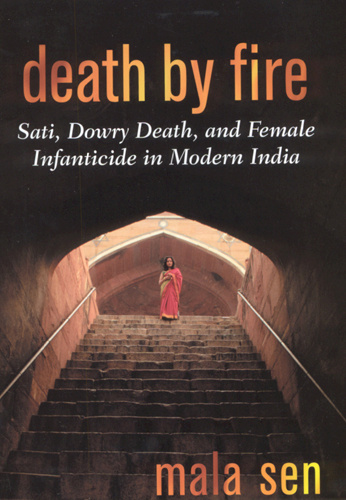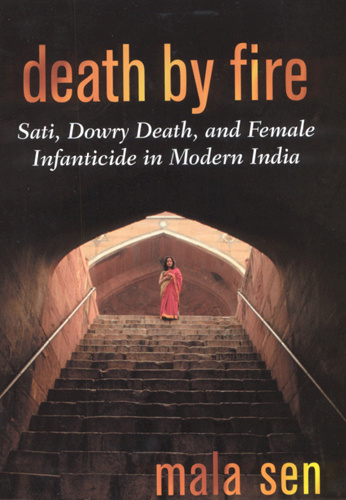Death by Fire
Sati, Dowry Death, and Female Infanticide in Modern India
The Indian village of Deorala in Rajasthan, the northwestern Indian state that borders Pakistan, is neither remote nor feudal in the strictest sense. A tarmac road links the population of 10,000 to neighboring villages and towns, there is running water and electricity, and the villagers have had television for more than twenty years. On September 4, 1987, Deorala found itself in the center of a furor that awoke age-old conflicts in Indian society. Before a crowd of several thousand people, mostly men, a young woman dressed in her bridal finery was burned alive on her husband’s funeral pyre. The apparent revival of an ancient tradition opened old wounds in Indian society and focused world attention on the status and treatment of women in modern India.
The ancient practice of sati — the self-immolation of a woman on her husband’s funeral pyre — was outlawed by the British administration in India in 1829, and sati was widely believed to have died out. The fate of 18-year-old Roop Kanwar changed that perception. Mala Sen explores the reality of life and death for women in modern India in a study that is both illuminating and terrifying. The book is part journey through the India that the author knows and loves, and part exploration of the enigma that India still remains in the minds of many. Starting with Kanwar, Sen enters the worlds of three women: a goddess, a burned bride, and a woman accused of killing her daughter, and shows how, in this society in which ancient and modern apparently co-exist comfortably, there is increasingly cause for real alarm. She creates an image of a state in which political turmoil is constantly at the surface, and in which the role of women is constantly being redefined.
Sen tries to understand sati's place in Indian culture rather than simply condemn it and also writes in detail about Indian attitudes to women, their social standing and the practice of killing baby girls so that poverty-stricken parents do not have the financial worry of providing a dowry. A fascinating journey in the broadest sense through a particular landscape of modern India.
Death by Fire is dedicated to 'all the women of India, who continue to struggle for social change and justice despite the odds ranged against them.' It is a very fine tribute, and will be valued too in this country, where male violence against women is far from unknown.
This litany of horror stories makes grim reading yet it is made bearable by Mala Sen's sympathetic presence in the text. . . . Her tenacity and exhaustion, combined with her frank admiration for the campaigners she meets, are as affecting as any amount of conventional political analysis. The result is that rare thing, a narrative that is at once horrifying and quietly inspirational.
Sen's personal account takes us behind the familiar headlines. . . . this book should be read if only because it interrupts the usual traffic in tales of persecution by tradition.
Sen's grippingly honest book . . . takes a stark look at aspects of India that were until recently taboo. Engrossing, horrifying and beautifully written.
Editors' Note
Introduction: Reading the Fragments
PART I. NEW AXES OF SOCIAL DIFFERENTIATION
The New Middle Class and the Joys of Suburbia
The Doorkeeper, the Maid and the Tenant: Troubling Encounters in the Turkish Urban Landscape
Encounters at the Counter: Gender and the Shopping Experience
Discipline, Success and Stability: The Reproduction of Gender and Class in Turkish Secondary Education
PART II. CULTURAL PRODUCTION AND THE PRODUCTION OF CULTURE
Playing Games with Names
`I Dance Folklore'
The Film Does not End with an Ecstatic Kiss
Global Consumerism, Sexuality as Public Spectacle, and the Cultural Remapping of Istanbul in the 1990s
The Islamist Paradox
PART III. SHIFTING IDENTITIES AT HOME AND ABROAD
The Market for Identities: Secularism, Islamism, Commodities
`We Pray Like You Have Fun': New Islamic Youth in Turkey between Intellectualism and Popular Culture
Pink Card Blues: Trouble and Strife at the Crossroads of Gender
A Table in Two Hands
Negotiating Identities: Media Representations of Different Generations of Turkish Migrants in Germany
Afterword: Recognizing the Everyday





